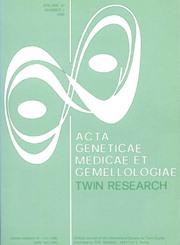Article contents
Twin Similarity in the Developmental Transformations of Infant Temperament as Measured in a Multi-Method, Longitudinal Study
Published online by Cambridge University Press: 01 August 2014
Abstract
In the Louisville Twin Study, laboratory observations of twin infants' temperament at 12, 18, and 24 months were linked with parental ratings from temperament questionnaires. Core dimensions of temperament were extracted by factor analysis applied to each set of measures at each age. The laboratory temperament dimension was recurrently represented by emotional tone, social orientation, attentiveness, and reaction to restraint. The questionnaire temperament dimension was recurrently represented by mood, approach/withdrawal and adaptability. The laboratory and questionnaire dimensions were found to be correlated at each age (convergent correlations: 0.38 to 0.52) and to be stable across ages (stability correlations 0.37 to 0.66). The temperament dimensions were used to demonstrate that temperament profiles were more concordant for identical than for fraternal twin pairs. The results demonstrate the genetic influences on (a) the primary dimensions of temperament and (b) the developmental transformations of temperament.
Keywords
- Type
- Twin Development and Temperament
- Information
- Acta geneticae medicae et gemellologiae: twin research , Volume 33 , Issue 2 , April 1984 , pp. 181 - 189
- Copyright
- Copyright © The International Society for Twin Studies 1984
References
REFERENCES
- 6
- Cited by


